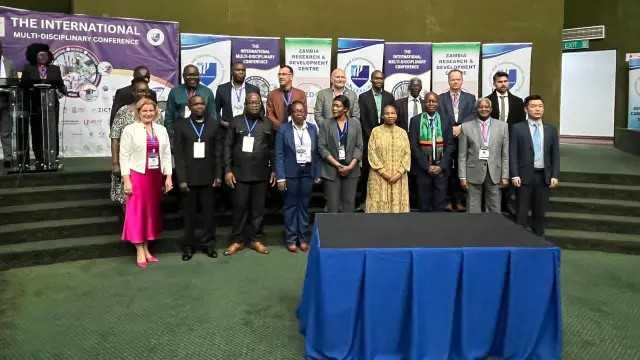Russia’s growing engagement with Africa took centre stage at the 2024 International Multi-Disciplinary Conference (IMDC) in Lusaka, Zambia, underscoring Moscow’s focus on bolstering partnerships across the continent. Among the key participants was Inga Koryagina, Associate Professor at Plekhanov Russian University of Economics and Director of International Development at the Russian-African Club.
Her visit to Zambia highlighted Russia’s strategic interest in Africa amid shifting global dynamics. At the conference, Koryagina delivered a keynote address emphasising the importance of fostering economic and cultural cooperation between Russia and African nations. She spotlighted the role of the BRICS bloc, particularly in its expanded BRICS+ format, as a mechanism to achieve sustainable development and address shared global challenges.
Zambia as a nexus for international dialogue
The IMDC, one of Zambia’s leading academic events, brought together nearly 100 speakers from 20 countries, including Russia, China, and the US, alongside representatives from across Africa. Hosted at the Mulungushi Conference Centre, the event was themed “Fostering Knowledge Sharing and Innovation Competitiveness for Production-Enabled Development.”
Koryagina’s presentation explored areas such as urban management, ecology, and digitalisation, offering examples of how BRICS nations can exchange expertise for mutual benefit. She also chaired the “Business and Applied Management Sciences” section, facilitating discussions on innovative solutions for applied management.
During her visit, she engaged with Zambian officials, including Dr Richard Silumbe of the Zambia Research and Development Centre, to explore student exchange programmes and academic partnerships. An agreement between Plekhanov Russian University and Mulungushi University was a tangible outcome of these talks, marking a step forward in educational collaboration.
Multipolarity and BRICS: A shared vision
Koryagina stressed the importance of regional initiatives like the BRICS International Municipal Forum, a platform for investment and knowledge-sharing, particularly in the Global South. Her remarks came against the backdrop of a shifting geopolitical order, with BRICS nations increasingly asserting themselves as alternatives to Western-led multilateral institutions.
Africa’s role in this new multipolar world was a recurring theme during the conference. Zambia, with its strategic position in southern Africa and its growing academic and cultural networks, has emerged as a focal point for international partnerships.
Diplomatic and cultural engagements
Beyond the conference, Koryagina met with Azim A. Yarakhmedov, Russia’s Ambassador to Zambia, and Svetlana N Kovalyova, head of Rossotrudnichestvo’s Zambia office. These meetings reinforced Russia’s commitment to deepening its presence in the region through cultural and educational initiatives.
Her visit coincided with Zambia’s graduation ceremony for Information and Communications University students, where Koryagina presented awards to top graduates. This gesture symbolised Russia’s support for academic excellence and its intent to nurture long-term ties with African youth.
Russia-Africa ties in a broader context
Koryagina’s trip exemplifies how Russia is leveraging education, business, and culture to strengthen its influence in Africa. As BRICS expands its footprint and competition for African partnerships intensifies, Zambia’s role as a bridge for international dialogue is becoming more significant.
Russia’s engagement in Africa aligns with its vision for a multipolar world, one where nations of the Global South wield greater agency in shaping their destinies. For Zambia, deepening ties with Russia offer a counterbalance to Western influences while opening doors to new opportunities for development.
This event, and Russia’s active participation, reflects a shared commitment to fostering cooperation that transcends borders, creating a platform for sustainable and inclusive growth in an increasingly interconnected world.

